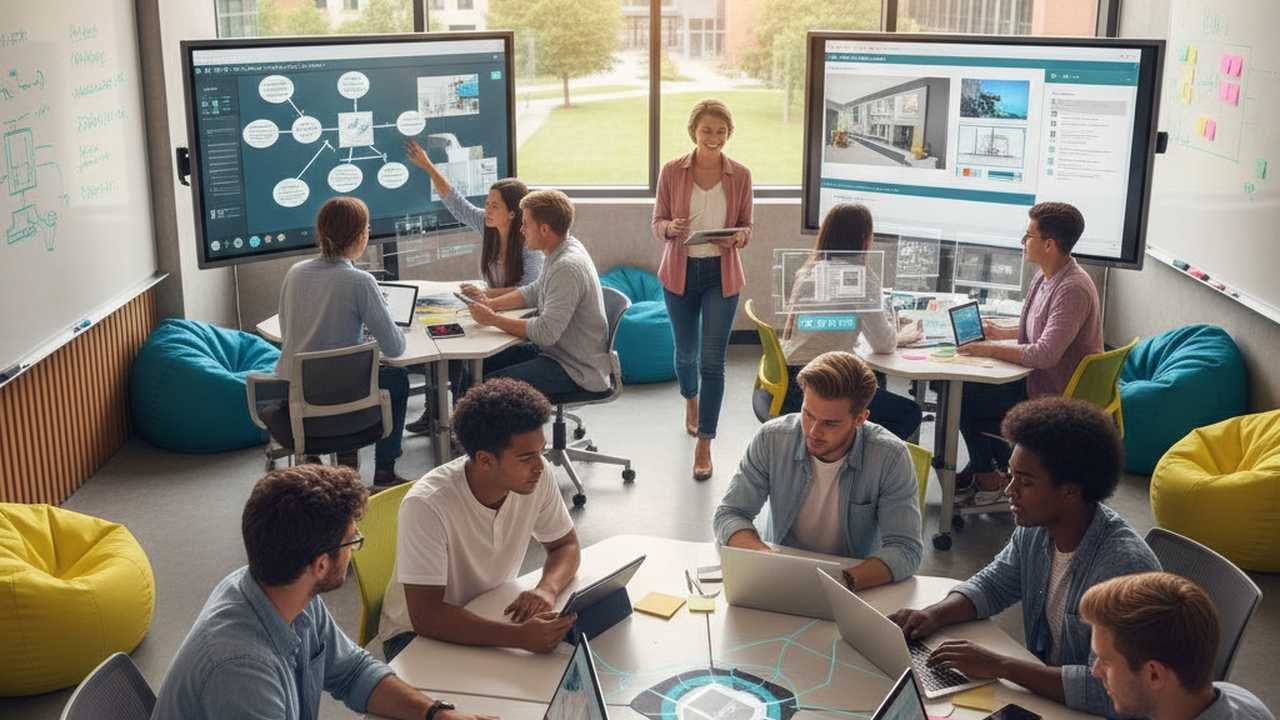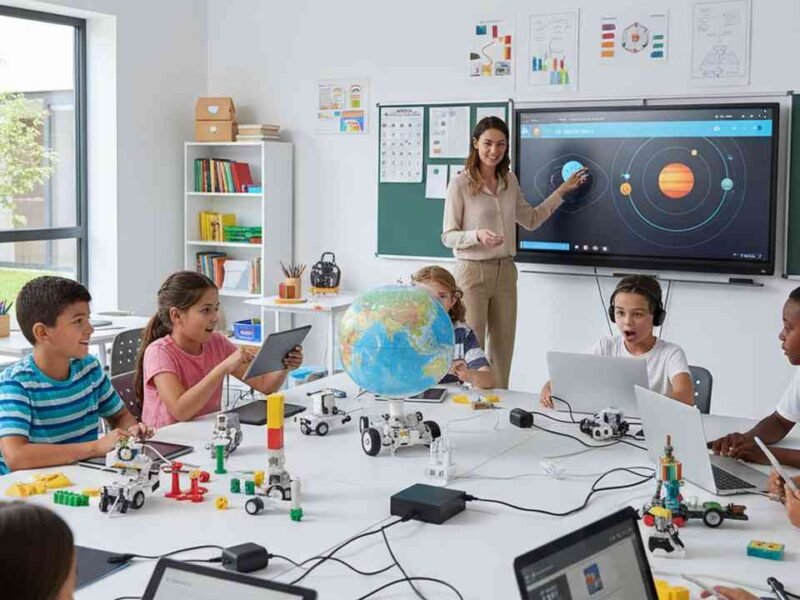Unlocking the Full Potential of EdTech in the Kuwait Education System
Imagine a classroom where students are no longer bound by desks and textbooks, but are immersed in a vibrant digital ecosystem that fuels creativity and collaboration. The kuwait education system is at a pivotal moment, teetering on the edge of a technological renaissance. Schools are rapidly integrating EdTech tools that allow learners to work together seamlessly, exchanging ideas across devices, platforms, and even time zones. In this hyper-connected environment, collaborative learning projects become more than assignments – they transform into dynamic experiences that cultivate critical thinking, problem-solving, and social skills. Students can now annotate digital whiteboards in real time, share interactive simulations, and co-create multimedia presentations that rival professional productions. However, the urgency to adopt these technologies is palpable; institutions that delay risk leaving their students behind, while forward-thinking schools harness the power of EdTech to craft a cutting-edge, participatory learning culture. The potential for the kuwait education system to leapfrog into global recognition hinges on immediate and strategic deployment of these tools, ensuring every student can thrive in an increasingly competitive world.
Choosing the Right EdTech Tools for Seamless Collaboration
Selecting the right EdTech tools is akin to choosing the perfect instrument in an orchestra: the wrong choice can disrupt harmony, while the right selection creates a symphony of learning. In the kuwait education system, educators are navigating an overwhelming sea of options – ranging from cloud-based collaborative platforms to AI-driven project management software. It is critical to prioritize tools that are intuitive, secure, and capable of supporting multiple simultaneous users without latency issues. Tools like Google Workspace, Microsoft Teams for Education, and interactive simulation platforms offer not just functionality but also compliance with rigorous data protection and licensing standards, assuring administrators that sensitive student data is safeguarded. Real-world examples show that when students use these tools effectively, project completion times drop by over 30%, engagement skyrockets, and the quality of collaboration improves dramatically. Missing this technological wave can mean falling behind peers both regionally and globally, which makes the decision-making process urgent and essential. Every day that passes without leveraging these solutions is a missed opportunity to revolutionize how students collaborate and innovate in the kuwait education system.
Designing Projects that Inspire Engagement and Innovation
Collaborative learning is not just about working together – it’s about creating experiences that ignite curiosity and drive innovation. Within the kuwait education system, educators are increasingly designing projects that integrate real-world challenges, forcing students to think critically, communicate effectively, and experiment boldly. Imagine students constructing sustainable city models, developing coded solutions for traffic management, or producing interactive historical documentaries using VR technology. These projects require dynamic coordination, which EdTech tools facilitate by offering real-time progress tracking, instant feedback loops, and shared digital workspaces. Scenarios from local schools demonstrate that when students engage in such immersive projects, retention of knowledge improves significantly, and soft skills like leadership and negotiation blossom. The stakes are high: educators who fail to integrate engaging project designs risk fostering passive learners, while schools embracing innovation create an environment where every student feels empowered to contribute meaningfully. In today’s fast-paced educational landscape, the urgency to craft engaging projects with EdTech support is undeniable, especially for institutions striving to elevate the kuwait education system to new heights.
Leveraging Real-Time Communication for Enhanced Collaboration
The heartbeat of successful collaborative projects lies in real-time communication, and EdTech platforms have made instantaneous interaction not only possible but essential. In the kuwait education system, schools implementing tools like Slack, Zoom, and interactive chat features within LMS platforms have witnessed remarkable transformations in project efficiency. Students can brainstorm, debate, and refine ideas without waiting for the next class session, leading to more fluid and cohesive teamwork. Imagine a team of students, dispersed across different schools in Kuwait, editing a shared digital portfolio, discussing strategy over live video, and tagging tasks to ensure nothing falls through the cracks. This immediacy fosters a sense of urgency and accountability, making students more invested in outcomes. Furthermore, educators can monitor interactions, offer guidance, and provide timely interventions, ensuring collaboration remains productive. Schools that delay adopting real-time communication tools risk stagnation, creating an educational environment where innovation and responsiveness lag behind global standards. The momentum is critical, and embracing these tools now can dramatically redefine the impact of collaborative learning within the kuwait education system.
Integrating Gamification to Drive Participation and Motivation
Gamification transforms collaborative learning from mundane tasks into exhilarating challenges that students eagerly tackle. The kuwait education system is uniquely positioned to benefit from gamified EdTech tools that incentivize participation through points, badges, and interactive leaderboards. Envision a classroom where students unlock levels for completing project milestones, compete in creative problem-solving quests, and collaborate to achieve collective goals that mirror real-world scenarios. This sensory-rich engagement creates a palpable energy, pushing students to invest more effort and creativity into their projects. Empirical data from international studies show gamification increases retention rates, heightens motivation, and enhances team cohesion. By integrating these tools, educators can tap into intrinsic motivation, ensuring students are not only completing projects but actively seeking ways to innovate and excel. Ignoring gamification now risks disengagement, leaving students disconnected from their collaborative potential. The kuwait education system must act immediately to harness these interactive mechanisms, transforming classrooms into hubs of dynamic, competitive, and deeply engaging learning.
Ensuring Accessibility and Inclusivity in Digital Collaboration
Accessibility and inclusivity are no longer optional – they are central to effective collaborative learning in a digitally enhanced environment. Within the kuwait education system, schools must adopt EdTech solutions that accommodate diverse learning needs, from students with visual impairments to those requiring adaptive learning software. Tools that feature customizable interfaces, screen readers, and multilingual support empower every student to contribute meaningfully to group projects. Consider a collaborative research project where students with varying abilities can simultaneously contribute by submitting voice notes, annotated visuals, or interactive simulations. These inclusive practices not only enrich the project with diverse perspectives but also instill a culture of empathy, collaboration, and shared accountability. Failing to prioritize accessibility risks marginalizing learners and diminishing the overall quality of collaboration. Immediate adoption of inclusive EdTech tools ensures no student is left behind, reinforcing equity and excellence throughout the kuwait education system.
Monitoring and Evaluating Collaboration for Continuous Improvement
Assessment is a crucial component of collaborative learning, and EdTech enables real-time monitoring and evaluation that transforms project management into a science of continuous improvement. In the kuwait education system, educators utilize dashboards, analytics tools, and automated feedback systems to track individual contributions, team dynamics, and overall project progress. Visual graphs, heat maps, and activity logs provide granular insight, helping teachers intervene strategically to address bottlenecks, recognize achievements, and adjust project parameters. Students gain immediate feedback, fostering self-regulation, accountability, and a growth mindset. Real-world case studies demonstrate that teams with access to such analytical tools outperform peers in creativity, cohesion, and efficiency. Schools that neglect monitoring risk allowing unproductive habits to persist, resulting in uneven participation and diminished learning outcomes. The urgency to implement robust evaluation systems cannot be overstated, as these tools directly enhance collaborative proficiency and the effectiveness of the kuwait education system in nurturing capable, adaptive learners.
Training Educators to Maximize EdTech Impact
Even the most advanced EdTech tools are ineffective without educators fully equipped to leverage their capabilities. The kuwait education system faces a critical juncture: professional development must go beyond basic technical skills, encompassing pedagogical strategies that optimize collaborative learning. Workshops, certifications, and mentorship programs provide teachers with actionable insights into integrating gamification, real-time communication, and accessibility features into project workflows. Imagine a teacher guiding a student team through a complex VR simulation, offering timely feedback, and dynamically adjusting project parameters – all made possible by targeted training. Evidence from leading educational institutions confirms that well-trained educators dramatically increase student engagement, reduce project completion time, and foster a culture of innovation. Delay in educator training risks undermining technological investments, rendering tools underutilized or misapplied. Immediate, structured, and continuous professional development is essential for transforming EdTech from a mere novelty into a catalyst for excellence in the kuwait education system.
Building a Culture of Urgency and Innovation
The most successful implementation of collaborative EdTech occurs within a culture that prizes urgency, innovation, and continuous experimentation. In the kuwait education system, schools embracing this mindset foster environments where students feel empowered to take risks, iterate on ideas, and celebrate both successes and failures as learning opportunities. Visualize classrooms buzzing with energy, screens alive with real-time project updates, and students eagerly collaborating across digital spaces – every moment reinforcing the importance of swift action and creative problem-solving. Industry-leading studies confirm that institutions fostering such a culture produce graduates with superior critical thinking, adaptability, and collaborative proficiency. Conversely, schools that hesitate or resist cultural change risk stagnation, leaving learners unprepared for global challenges. The time to act is now: embedding urgency and innovation into daily practice ensures the kuwait education system remains at the forefront of educational excellence.
Driving Results with Verified, Trusted, and Secure EdTech Platforms
Finally, the foundation of successful collaborative learning lies in using EdTech platforms that are trusted, verified, and secure. Within the kuwait education system, administrators and educators must prioritize solutions with clear licensing, responsive customer support, verified payouts for learning incentives, and robust data security measures. For example, platforms certified by recognized educational technology authorities ensure compliance with privacy laws, secure handling of student data, and seamless integration with existing systems. Real-world experiences show that schools leveraging such platforms report higher user satisfaction, more consistent project outcomes, and reduced technical disruptions. The FOMO is real: institutions that delay implementing secure, trustworthy solutions risk data breaches, unreliable performance, and diminished confidence in digital learning initiatives. Immediate adoption of these platforms not only protects students and staff but also reinforces the credibility and effectiveness of collaborative learning projects in the kuwait education system. Act now to secure your place at the cutting edge of educational innovation, transforming classrooms into dynamic hubs of creativity and achievement.


